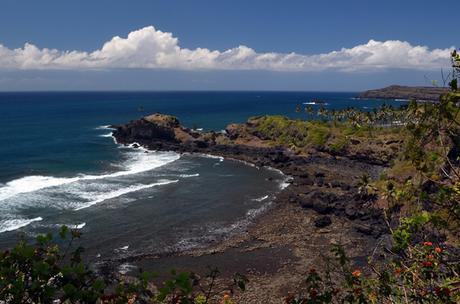
Comoros might just be my favorite stop in the Indian Ocean. I’ll readily acknowledge that it’s on departure after a too-short stay that I’m likely to look at a place through the most favorable and wistful lens, but our two weeks here surfaced challenges, beauty, culture and wonders like we’ve not seen so intensely in quite a while. Given how exotic our Totem’s track is this year, that’s significant!
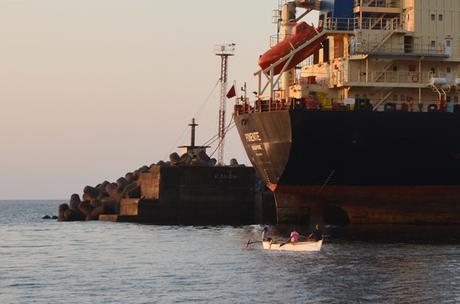
Cruising lets us experience some places that are truly picture-postcard perfect, the kind of paradise that would feel contrived if it weren’t real… turquoise water and white sand and all that. A superimposed fruity drink with an umbrella wouldn’t be out of place. Comoros… was absolutely nothing at all like that idyllic image. And we loved it.
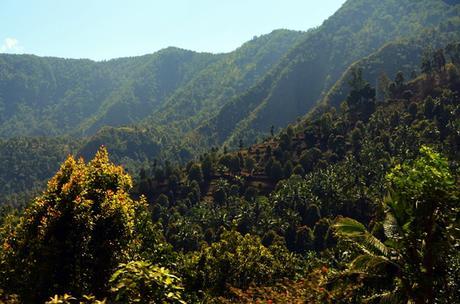
a hillside of clove trees: every possible square meter cultivated
It’s challenging: the formalities are a fluid process, rife with uncertainty. It is poor in ways that are hard to fathom from a comfortable chair in a developed country, but in your face (uncomfortably?) for visitors. It’s dirty: garbage collection doesn’t really exist; the standard method for disposal is to dump it over the seawall in a wheelbarrow. It’s hard to communicate: we don’t speak French, and my dozen quick-study Comorian words and phrases only get so far.
None of these really detracted from the experience. OK, that’s not true – I could do without the dirt. We quickly blackened the water in a foot bath used to clean after from every shoreside foray. One of the larger garbage dumps for Mutsamudu (population ~80,000) was the shoreline behind our anchorage. Here it is from a distance…smoldering away…
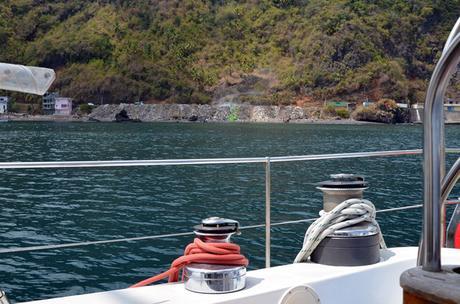
…and here’s a zoom in for perspective: those are people walking at the bottom of those plastic green rice sacks, and the shell of a car is in there too. It constantly burned (with the occasional pop of a bottle for dramatic effect) and when the breeze put us downwind, it was unpleasant.
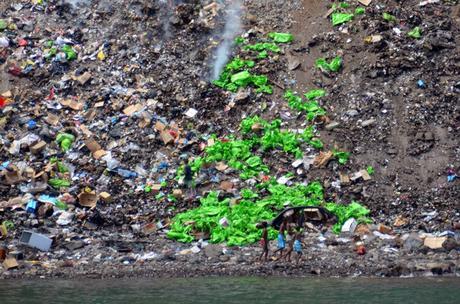
But the other challenges just pressed us to engage closer, and that inevitably brought rewards. We had a tremendous advocate, the agent Maketse Yssouf, who made clearance easy. We mostly just had to follow him around while he took care of business, bystanders to the generally protracted and occasionally uncomfortable exchanges with officials. He went far beyond the call of agent services (like ferrying Evan from Ceilydh around on many trips on the back of his motorbike, to find wood and screws to fix their catwalk on arrival, then diesel before departure when the island was experiencing a fuel shortage, and being our guide/translator for walks around town and daytrips in the island). He’s the man to know in Anjouan (future visitors: he’s reached at 002693324340 or [email protected]).
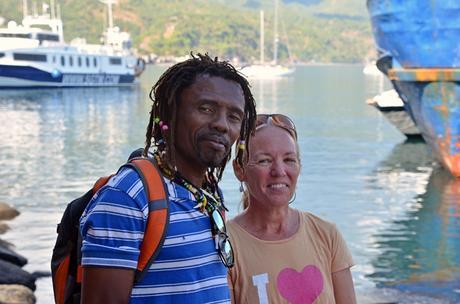
thanks and credit to Evan Gatehouse for getting a photo of Maketse with me!
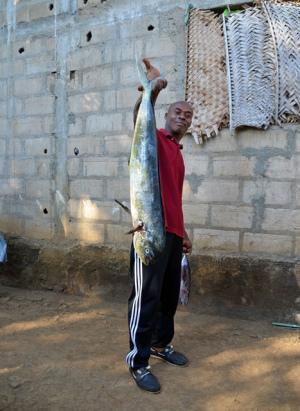
Or the time I went in search of a koffiya (richly embroidered cap worn by Muslim men here), and was taken by hand down the narrow alleyways of the medina built by medieval Arab traders to a small shop with spices, brass chalices and… the finely stitched koffiya. So many times I wish I spoke just a little more French, but it’s amazing what you can accomplish when you just try.
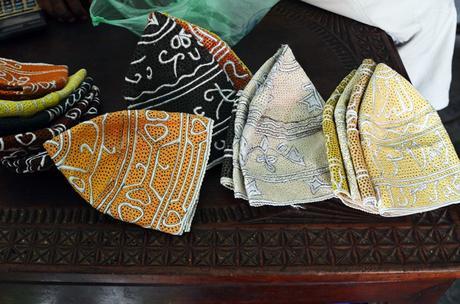
And then there was the brush of familiarity, even in our short stay. As a friendly, international group of NGO workers we meet remind us that there is no anonymity, we stand out in a crowd. With few visitors, and looking very different, I managed to see a few people over and over as they accidentally or intentionally recross my path, and each time a warm greeting. (I’m pretty sure the Utopia became heroes at the bakery they frequented for baguettes.)
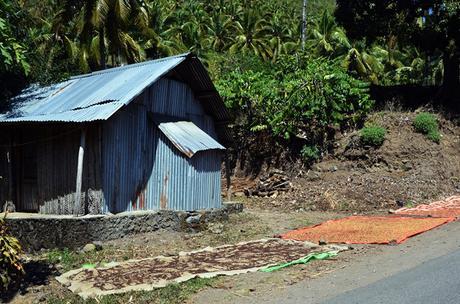
cloves drying on the ground in front of a rural home
It is not just the people, but the colors and sounds and smells and flavors. I mean, sometimes it’s the smell of rotting garbage…not so great. But more often, despite the mess, it’s the scent of cloves – this is the season they’re dried on rooftops and street sides all over the island– or ylang ylang (think: Chanel No. 5). Comoros is apparently the world’s largest producer of this very fragrant floral essential oil, and it wafts behind women along tottering on platform sandals.
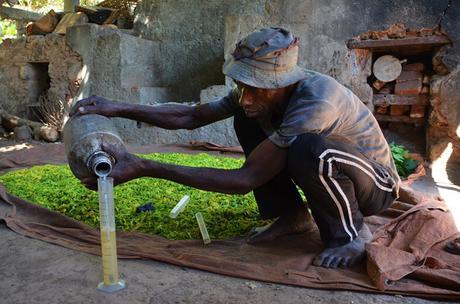
measuring specific gravity of oil at a distillery, with a pile of chartreuse ylang-ylang
The colors here are so vivid. The cloth wraps which Comorian women wear (wrapped loosely over what seems like a complete outfit- leggings and t-shirts common). The sandalwood powder used as a beautifying foundation with dark kohl eyeliner and eyebrows.
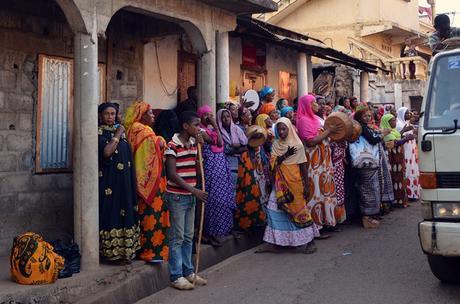
Inadvertently interrupting yet another streetfront wedding celebration
The only regret I have as we leave Comoros is our disconnect with the kids in Mutsamudu. Every day during our first week here, curious and energetic kids paddled out to Totem in all manner of craft, from single-trunk dugouts to rice bags stuffed with plastic bottles. It’s a lot of fun for us to have local visitors on Totem, and kids especially are a treat – treating Totem like a waterpark, helping us with a few words, introducing us to local culture. But we were warned by Maketse that some of these cherubs weren’t quite so sweet, and may be spotters that would inform shoreside thieves of what might be had from our decks. But what hammered it home was the possibility that any trouble would bring police knocking on Maketse’s door, since his extended family encompassed some of the junior visitors. That was a line we weren’t going to cross, so with some reluctance, Totem was closed for fun and games in Mutsamudu.
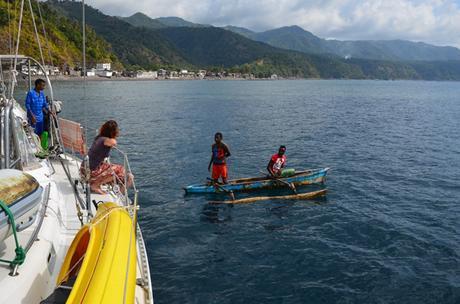
Aline helps interpret with the kids: some speak pretty good French
Walking down the waterfront road one afternoon, I met an English tourist who seemed happy for a break in the shade and a chat in a familiar language. He was frustrated because the boats between islands weren’t running on a schedule he could plan around.
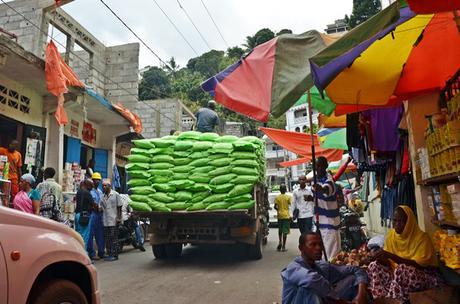
roads…one car wide. no sidewalks. enjoy!
He was tired of the noise and the lack of organization. The food wasn’t agreeing with him. The poverty made him uncomfortable.
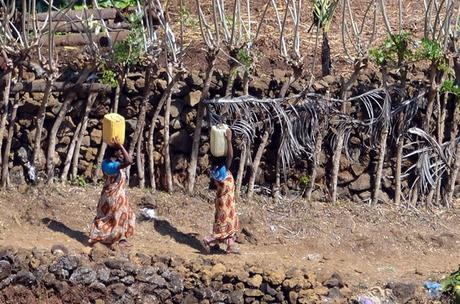
Certainly this is an easier place to visit when we travel with our own beds, and pantry. But mostly it’s what you make it: if we wanted a perfectly predictable, comfortable life – we wouldn’t be cruising. But it is the question of possibility, of what we’ll learn when pushed outside the usual boundaries, that are core to why we embrace our life afloat. And when we are helped across those hurdles (which, really, aren’t so hard) in Comoros, what’s left is fascinating. Thank you Maketse. I wish we didn’t have to leave so soon.
This post is syndicated on Sailfeed – clicking through puts change in our cruising kitty. Thank you!
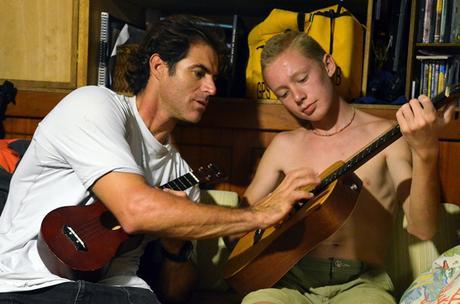
Comoros was as much about great memories with Armand (here teaching Niall guitar) and Aline as the place itself
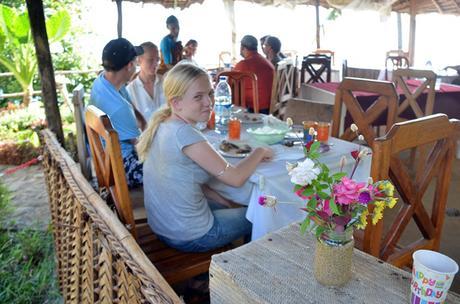
the best octopus curry EVER at Sultan’s Hotel in Moya, southeast Anjouan
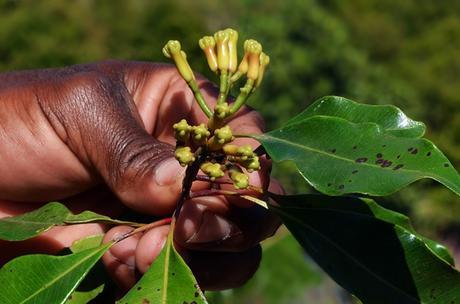
Maketse holds a sprig of green cloves

